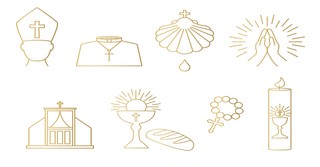What Are the Sacraments of Christianity?
Share

What is a sacrament of Christianity? Communion and baptism are sacraments of Christianity in which we share the confession of our faith, our belief and acknowledgment that Jesus is God and Savior. Through the physical actions of baptism and of partaking in the drink and bread during communion, we are drawing closer to God.
What Does “Sacraments” Mean?
A dictionary defines a sacrament as “a Christian rite (such as baptism or the Eucharist) that is believed to have been ordained by Christ and that is held to be a means of divine grace or to be a sign or symbol of a spiritual reality.”
A sacrament involves a physical action. When we share in communion, the bread and drink are prayed over and taken into the body.
With baptism, water is involved. Some churches request only those baptized take communion, while others allow anyone to take the elements. Some churches have communion monthly, while others serve communion only on special occasions or holidays.
Some churches encourage baptizing babies, while others want people to be baptized after attending confirmation classes which teach the true meaning of faith in God and the reason for baptism and giving our lives to God.
What Sacraments Are Mentioned in the Bible?
Baptism and communion are mentioned in Scripture. The Bible states that baptism is not about physically cleansing the body. “Baptism, which corresponds to this, now saves you, not as a removal of dirt from the body but as an appeal to God for a good conscience, through the resurrection of Jesus Christ” (1 Peter 3:21 NIV).
John the Baptist baptized Jesus in the Jordan River: “As soon as Jesus was baptized, he went up out of the water. At that moment heaven was opened, and he saw the Spirit of God descending like a dove and alighting on him. And a voice from heaven said, “This is my Son, whom I love; with him I am well pleased” (Matthew 3:16-17 NIV).
Scripture shares how Jesus participated in communion. During the Last Supper, as Jesus sat with the disciples, He gave a profound message:
“While they were eating, Jesus took the bread, and when he had given thanks, he broke it and gave it to his disciples, saying, “Take and eat; this is my body. Then he took a cup, and when he had given thanks, he gave it to them, saying, “Drink from it, all of you. This is my blood of the covenant, which is poured out for many for the forgiveness of sins. I tell you, I will not drink from this fruit of the vine from now on until that day when I drink it new with you in my Father’s kingdom” (Matthew 26:26-29 NIV).
The bread and the drink are symbols and not to be worshiped. We are called to worship God, not things.
What Sacraments Do Protestants Practice?
Baptism and communion are two sacraments that Protestants practice regularly. Although individual churches may choose varying methods of experiencing these sacraments, the intent is clear—repentance of sins and dedication of life to God.
The clergy in some churches will invite baptized members and visitors to come to the table and partake of communion. As we are called to the table, sometimes people are invited to physically leave their seats and experience a meaningful journey to the Communion table and be served by church elders. Other churches have ordained leaders of the church who serve the elements to people seated. Either way, partaking of the elements is important. Church leaders may say words such as “This is the body of Christ, broken for you.” when serving the bread. A person serving the wine or juice may say, “The blood of Jesus shed for you.” Music is often played as the sacraments are served.
A time for prayer and reflection helps us remember God’s love, forgiveness, and mercy for His people.
Baptism involves washing away the old and accepting the new. Baptism symbolically washes away the old and brings in the new life in Christ. One way action may be fulfilled through immersion under water is in a church’s baptismal font or a river. Some churches sprinkle water over a person.
There are churches of some denominations that believe in baptism more than once. Protestants believe there is one baptism.
People have been baptized on their deathbeds. God always leaves the door open for us to accept Him into our lives at any time.
The Bible shares how we are to baptize:
“Therefore go and make disciples of all nations, baptizing them in the name of the Father and of the Son and of the Holy Spirit” (Matthew 28:19 NIV). Jesus commanded the disciples to baptize and teach others.
What Sacraments Do Roman Catholics Practice?
While Protestants practice two main sacraments, the Roman Catholic Church has seven sacraments. The list includes Baptism, Confirmation, Eucharist, Penance, Anointing of the Sick, Holy Orders, and Matrimony.
Baptism is the first and basic sacrament. Water is usually poured on the person’s head three times. The words recited during the ceremony may be, “I baptize you in the name of the Father and of the Son and of the Holy Spirit.”
Confirmation is only received once, just like baptism. The Eucharist, also called the Blessed Sacrament, is the act of taking communion.
The Sacrament of Penance is also called the Sacrament of Reconciliation. This is the sacrament of spiritual healing. Elements involved in the Sacrament of Penance are Contrition, Confession to a priest, Absolution, and Penance.
Anointing of the Sick is when a priest anoints a sick person with blessed oil.
Holy Orders is when a layman is made a deacon, a deacon is made a priest, and a priest is made a bishop.
Matrimony is a sign of the love uniting Christ and the Church. Spouses are permanently bonded together.
The sacraments of Christianity remind believers that God is forever with His people. When each physical and spiritual act is taken, the relationship between God and His children can deepen and renew.
How Do We Give Sacraments Without Physical Touch?
During the recent pandemic, sacraments were shared in new ways. Churches that once relied on homemade bread from church members to be used during communion had to find new ways to serve using safety precautions. Companies invented packets containing one side with a wafer and the other side with grape juice. Communion packets were handed out as the congregation entered the church building. Also, packets were taken to shut-ins so that they may participate in the taking of the elements.
For churches that had to close during the height of the pandemic, options such as online worship services have allowed continued church attendance, even if by computer or phone.
The words shared by the clergy are meaningful.
As for baptism, the physical action has not changed in some churches.
Uncertain times have called for new ways of making sure each person who wants to take communion can participate. Also, baptisms are still performed, and each person can have a renewal of body, mind, and spirit.
Church attendance may be returning to normal in areas of the world. The online option to worship continues for those who need to worship from home. Our hope is found in God, and comfort can be found in knowing He is with us forever.
A Prayer for Remembering the Sacraments
Father, thank You for the ways You provide so we can worship You. Even when times are challenging, we can continue to learn from Scripture and rest in Your presence. Amen.
In His Name,
Melissa Henderson
Photo Credit: Getty Images/chrupka

Melissa is the author of Licky the Lizard and Grumpy the Gator. Her passions are helping in the community and church. Melissa is an Elder, Deacon, and Stephen Minister.
Follow Melissa on Facebook, Twitter, Pinterest, and at https://www.melissaghenderson.